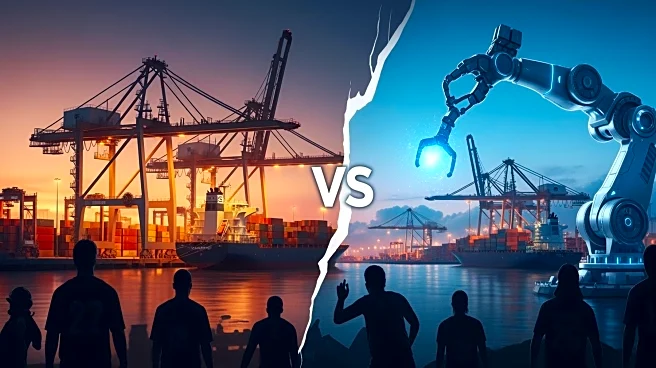What's Happening?
California Governor Gavin Newsom has vetoed Senate Bill 34, which aimed to restrict public funding for automation technology at the ports of Los Angeles and Long Beach. The bill was supported by the International Longshore and Warehouse Union (ILWU),
which argued that automation threatens dockworkers' jobs. SB 34 proposed banning public funds for automated infrastructure while allowing funds for human-operated, zero-emission equipment. The bill also sought to prevent the South Coast Air Quality Management District from capping cargo or cruise ship activity at these ports. Despite the union's lobbying efforts, Newsom vetoed the bill, citing ongoing negotiations between the air quality district and the ports. Environmental groups and community health advocates opposed the bill, while the Union of Concerned Scientists praised the veto, stating that SB 34 would have hindered air quality improvements.
Why It's Important?
The veto of SB 34 has significant implications for labor and environmental policies at California's major ports. By rejecting the bill, Governor Newsom supports ongoing efforts to improve air quality through electrification and automation, which could lead to reduced emissions. However, this decision is controversial among labor unions, as automation may reduce job opportunities for dockworkers. The veto highlights the tension between environmental goals and labor interests, with potential impacts on the economic competitiveness of California's ports. The decision also reflects broader debates on the role of automation in the workforce and its implications for job security.
What's Next?
Following the veto, the ILWU and other labor organizations may continue to advocate for policies that protect jobs from automation. The ongoing negotiations between the South Coast Air Quality Management District and the ports will likely focus on balancing environmental improvements with economic growth. Stakeholders, including shipping companies and community health advocates, will monitor the implementation of zero-emission infrastructure and its impact on port operations. The debate over automation and public funding may influence future legislative efforts in California and other states facing similar challenges.
Beyond the Headlines
The veto of SB 34 raises ethical questions about the use of public funds for technologies that may displace workers. It also underscores the need for policies that address the social and economic consequences of automation. As ports transition to cleaner technologies, there is a growing need for workforce retraining and support for affected workers. The decision may prompt discussions on how to balance technological advancement with social responsibility, ensuring that environmental progress does not come at the expense of job security.
















